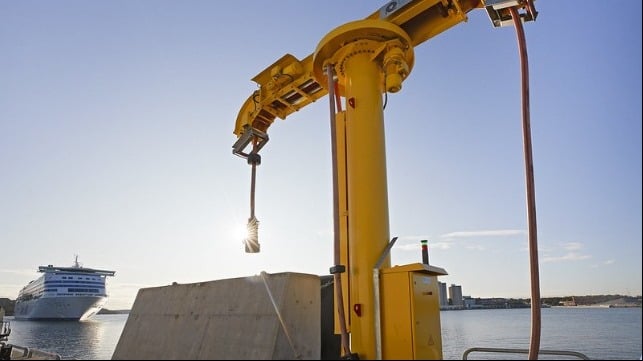Ports Join EU to Enhance Oceans Pledging to Reduce Stopover Emissions

The European Union is highlighting a broad range of initiatives agreed to at the closing of the three-day One Day Ocean Summit hosted by French President Emmanuel Macron in his role leading the Council of the European Union. Port authorities and stakeholders around the world joined in at the summit signing a joint commitment to reduce the environmental impact of stopovers made by container and cruise ships during their sea journeys. Other agreements focused on illegal fishing and increasing understanding of the oceans.
The declaration from the ports was led by the French Ministry of Transport and sets a new objective for promoting green maritime transport. In announcing the agreement, the organizations said that it aligns with the principle of the blue economy, which aims to make all human activities around seas, rivers, and lakes environmental-friendly and respectful of biodiversity.
Port authorities and stakeholders signed a joint commitment to reduce the environmental impact of stopovers expanding their focus which has mostly been on cruise ships and ferries to include containerships which make up a large percent of port traffic. The port authorities committed to deploying shore-side electricity supply for container and cruise ships by 2028.
The European Investment Bank announced its support for declaration and confirmed its commitment to support a low-carbon economy. EIB’s Vice-President, Ambroise Fayolle highlighted that ports play an essential role in the global connectivity of European economies and their regions. He noted that the EU has more than 300 sea-ports, which are part of the Trans-European Transport Network (TEN-T), emissions from ships at berth in EU ports represented around seven percent of CO2 emissions from maritime transport in the EU in 2020 as well as contributing to the noise in the surrounding heavily populated urban areas.
“In the fight against climate change, it is therefore fundamental to consider the role of ports as accelerators of ecological and energy transition and the contribution they can make to reduce global warming,” said Fayolle. “This commitment to deploy onshore electricity supply for container and cruise ships by 2028 will contribute towards reaching the targets set by the Paris Agreement and carbon neutrality at European level by 2050.”
The EU announced a range of additional agreements that came out of the conference as well as the formation of a coalition that will contribute to the ongoing negotiations on a Treaty of the High Seas currently being discussed at the United Nations. The goal is to have the treaty finalized and ratified in June 2022. Leaders will again meet in June in Lisbon at the U.N. Ocean Conference.
The nations attending the summit joined with the EU with commitments to expand their efforts to stop illegal fishing. They highlighted that illegal fishing is estimated to account for about one-fifth of fishing globally saying they would focus on ports and at sea creating better controls to stop the practice. Other agreements focused on stopping plastic pollution in the world’s oceans, a digital effort to model the oceans, and an expanding mapping to reach at least 80 percent of the world’s seabed by 2030 to help improve scientific knowledge. The EU will also work to enhance ocean literacy by education and investing in research.
